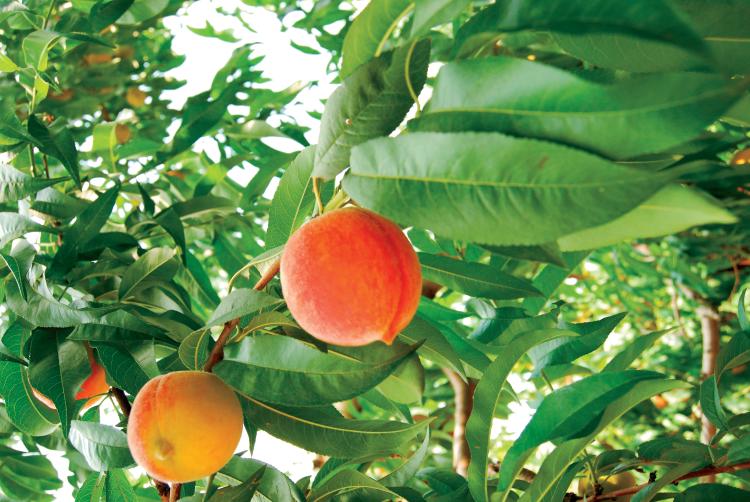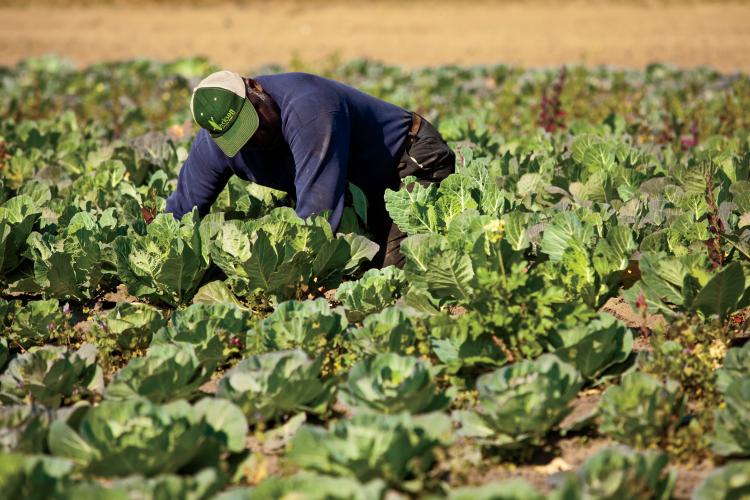Home > South Carolina > South Carolina Farm to Table > Consumers Look Close to Home for Fruits & Vegetables
Consumers Look Close to Home for Fruits & Vegetables

Collard greens have long had a place at the Southern table. Recently, they’ve earned another distinction – being named South Carolina’s state vegetable.
A nutritious plant, high in vitamin C and low in calories, collard greens are one of the many varieties of fruits and vegetables grown in the state. Other popular crops include peaches, watermelon, kale, tomatoes, leafy greens, cucumbers, blueberries and strawberries.
Joe Fields and his wife, Helen, grow some of these crops on their 50-acre Johns Island farm. A third-generation farmer, Fields is a certified organic grower. Until six years ago, he used conventional methods but switched to organic in response to demands from a health-conscious public.
“When you’re in business, you listen to the public,” says Helen Fields. “Although it’s more expensive to produce organic produce because it’s labor intensive, your fruits and vegetables taste so much better, and that’s what our customers are asking for.” The couple grows squash, beans, pickles, tomatoes, radishes, kale, lettuce, kohlrabi, strawberries and more, and sells the produce at local farmers markets and to restaurants and grocery stores.
The Fields’ farm is one of nearly 2,500 fruit and vegetable farms in South Carolina, the majority of which are small operations. But the impact to the economy is anything but small. In fact, the most recent data available from the National Agriculture Statistics Service indicates that South Carolina fruit and vegetables account for more than $150 million in sales.
Peaches are the top fruit, and leafy greens are a high-volume vegetable.

“South Carolina peaches are shipped across the eastern United States, and we have great volume on Southern cooking greens, like collard, kale and mustard greens,” says Charles Wingard, president of the South Carolina Fruit, Vegetable and Specialty Crop Association. “We deliver our greens to 30 states.”
“There seems to be a good deal of growth, particularly with new and smaller farmers,” he says. “In the industry, there is a stronger bond between consumers and producers than I’ve ever seen before. More consumers are making a decision to buy local, and farmers are seizing the opportunity to meet the demand. In South Carolina, we have an exceptional climate for growing fruits and vegetables. In fact, we can produce almost anything in season. And our growers do.”
Bradley O’Neal, owner of Coosaw Farms in Fairfax, SCSC, agrees that the natural harvest window in the state creates a strong growing environment. With 2,000 acres of watermelons, blueberries and greens in production in Allenville County, O’Neal says his operation is situated “about the furthest point north where you can still have a consistent supply of melons for the Fourth of July. Temperature is a big deal with produce. Although we’re not on the coast, we do get coastal influence, warming up a little earlier and staying dry when we need to be, which is good for growing produce. The South Carolina climate and soil is very well-suited to growing fruits and vegetables.”
O’Neal, a third-generation farmer, began his own operation in 1983. He began by growing watermelons and about six years ago added blueberries to the mix. “The timing of blueberries extends our workforce,” says O’Neal, explaining that the blueberry harvest begins in mid-April and extends through June.
In the 30 years O’Neal has been growing fruits and vegetables, he says the key to success has been a methodical, step-by-step process of producing a quality product that people can rely on.
“There are a lot of pieces to the puzzle when you are a large grower. Not only do you have to grow the product, you have to find a source of labor for harvest. You have to get established in the market and get the product to market,” which in his case means working with trucking companies to ship all the way up the East Coast for national distribution.
O’Neal’s children, Angela and Brad, are continuing the family tradition at Coosaw Farms, working with their dad to build on the company’s strong reputation for growing watermelons.
“It’s rewarding to work with my family,” says O’Neal. “And it’s rewarding to grow a product that I consider a ‘happy’ fruit. You know when you ship your fruit that you’re going to make thousands of people happy down the road somewhere. Plus, it’s a product you can be proud to grow because fruits and vegetables are so good for you.” Especially the ones grown in South Carolina.



